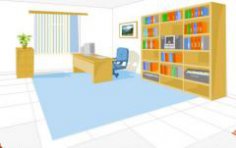
Around the world, smart cities are using technology to improve productivity. What about social development? Japan is staking on a new type of intelligent, people-oriented society, the 5.0 society.
The first stop is Aizuwakamatsu, an ancient samurai city in Fukushima Prefecture. The city with a population of 120 thousand is also a testing ground for social projects based on digital technology. At the local innovation center, partners are developing the Smart City platform, a model that, according to the authors, can be transferred to any city in Japan and beyond.
Data from connected resources – phone bills, electricity receipts – are streamed onto the platform. These are then embedded in the macro context of the municipality and become the subject of scrutiny by local authorities, energy suppliers, industrial companies… Together they create a smart household service.
Nakamura Shojiro presents the innovation center. He says: “Citizens submit their data to regional authorities on a voluntary basis. For example, in a medical project, information about your physical condition, data from the hospital can go to the municipality, a regional agency. They will analyze it and prepare recommendations on how and where you can better monitor your health.
The system requires citizens’ consent to collect and analyze personal information. The city portal created conditions for exchange of data between the citizens. The more information they provide, the more smart services the specialists will be able to develop.
A local resident, for example, has agreed to share his health data, which records his watch. “I’m glad if the data about me, a 62-year-old man, is useful to my peers,” he notes.
The findings are embedded in an extensive scientific study, with the goal of making recommendations for this age group.
Takahashi Mikik is the project manager from Japan: “When we finished the experiment, 89 percent of the participants said they had changed their attitude toward their own health,” she says. The second stop was the city of Arao on Kyushu Island, with only 52,000 people.
Arao was once defined by a coal mine that was part of the Miike complex, a UNESCO World Heritage Site. After the mine closed in the late 1990s, people began to leave Arao. To give the municipality a fresh start, authorities are betting on digital technology and smart solutions.
The local racetrack, for example, closed in 2012. But soon there will be a neighborhood where the main principles are sustainability and comfort. The city hopes to attract a thousand new settlers.
At the same time, the municipality offers several life-saving digital initiatives. A useful novelty is shared cab rides, a kind of carsharing. Thanks to artificial intelligence, you’ll be able to calculate the best route, reducing costs for all transport users.
Takahama Hiroshi often drives to the hospital. “Before they launched this cab, I used to take the bus, but I had to walk half a kilometer to the bus stop. And it was hard for me, harder than the clinic visits themselves,” he says. The price per trip is half that of a regular cab, which stimulates demand on the part of the population.
At the same time, the city is testing a pilot project called the Well-Being Mirror. The smart mirror will determine your pulse, assess the main parameters of your physical condition, your facial expression, and your smile. Based on the results of diagnosis, you can get recommendations to correct your lifestyle, for example, you should do more sports or, on the contrary, take more rest.
Tagawa Hideki represents the municipality of Arao. “We want to come to a society in which the quality of life is one or two steps higher than today,” he says. With the reliance on the new social model, Japan is striving to meet UN goals for more sustainable cities and communities.





